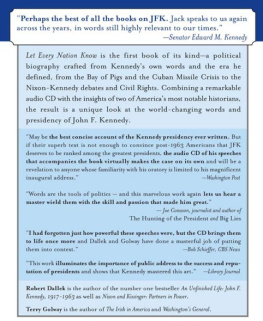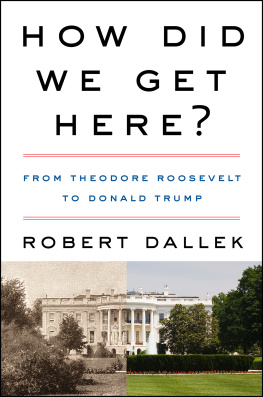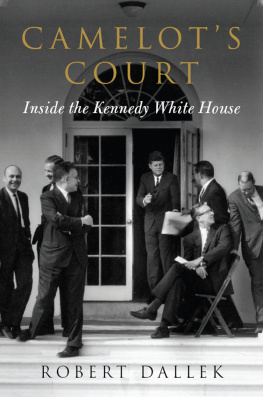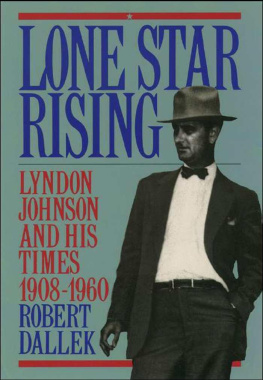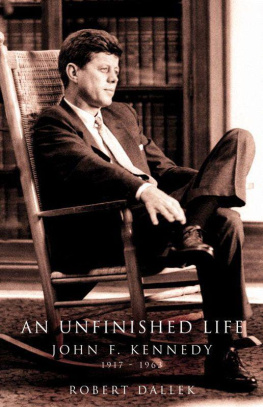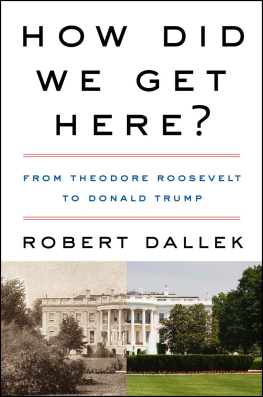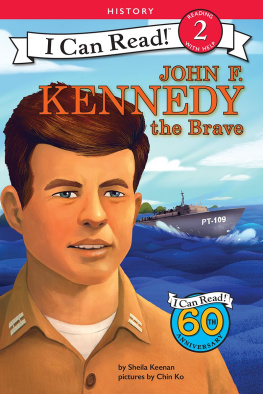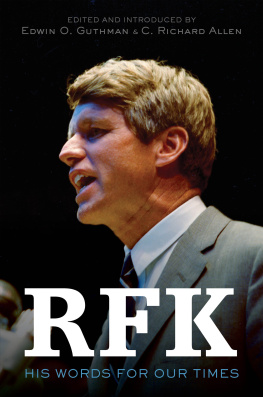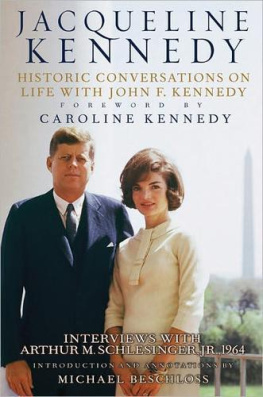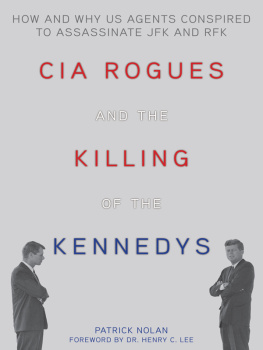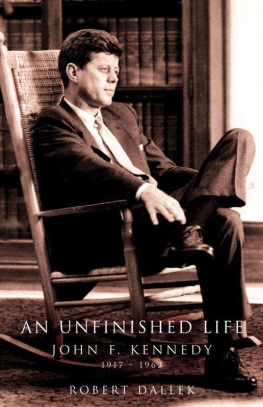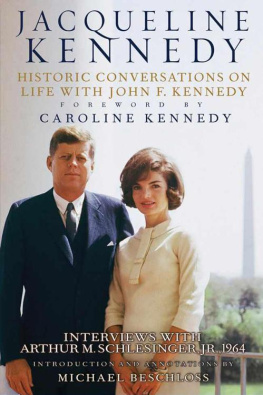Copyright 2006 by Robert Dallek and Terry Golway
Cover and internal design 2006 by Sourcebooks, Inc.
Cover photo by John Vachon
Sourcebooks and the colophon are registered trademarks of Sourcebooks, Inc.
All rights reserved. No part of this book may be reproduced in any form or by any electronic or mechanical means including information storage and retrieval systemsexcept in the case of brief quotations embodied in critical articles or reviewswithout permission in writing from its publisher, Sourcebooks, Inc.
Photo and audio credit information can be found at the end of the book.
Published by Sourcebooks MediaFusion, an imprint of Sourcebooks, Inc. P.O. Box 4410, Naperville, Illinois 60567-4410
(630) 961-3900
Fax: (630) 961-2168
www.sourcebooks.com
Library of Congress Cataloging-in-Publication Data
Dallek, Robert.
Let every nation know : John F. Kennedy in his own words / Robert Dallek and Terry Golway.
p. cm.
Includes bibliographical references and index.
1. Kennedy, John F. (John Fitzgerald), 1917-1963. 2. PresidentsUnited StatesBiography. 3. United StatesPolitics and government1961-1963. 4. PresidentsUnited StatesMessages. 5. Speeches, addresses, etc., American. I. Golway, Terry, 1955- II. Title.
E842.D27 2006
973.922092dc22
2005037973
Printed and bound in the United States of America.
LB 10 9 8 7 6 5 4 3 2 1
To Hannah Claire Bender
and Kate and Conor Golway:
the next generation
On the CD
The audio on the accompanying compact disc has been selected by the authors to enrich the experience of this book, to allow you to experience the words of John F. Kennedy in his own voice. These selections represent some of the most remarkable moments of his presidency and offer a window to the mind of the man. At the start of each chapter in the book, you will find an icon and track number denoting the corresponding speech on the CD. We encourage you to use and we hope you enjoy this mixed-media experience of the life of John Kennedy.

1: Address to the National Press Club January 14, 1960
2: Acceptance Speech, Democratic National Convention July 15, 1960
3: Address to the Greater Houston Ministerial Association September 12, 1960
4: The First Debate, Chicago September 26, 1960
5: The Second Debate, Washington, D.C. October 7, 1960
6: The Third Debate, New York and Hollywood October 13, 1960
7: The Fourth Debate, New York October 21, 1960
8: Address to the General Court of the Commonwealth of Massachusetts January 9, 1961
9: The Inaugural Address January 20, 1961
10: Announcement of the Creation of the Peace Corps March 1, 1961
11: Proposal of the Alliance for Progress March 13, 1961
12: Speech to the American Society of Newspaper Editors April 20, 1961
13: White House News Conference April 21, 1961
14: Address to the American Newspaper Publishers Association April 27, 1961

15: Special Message to Congress on Urgent National Needs May 25, 1961
16: Nationwide Address on the Berlin Crisis July 25, 1961
17: Address to the UN General Assembly September 25, 1961
18: Inaugural Anniversary Dinner January 20, 1962
19: Statement and News Conference April 11, 1962
20: Speech at Independence Hall, Philadelphia July 4, 1962
21: Address on Space Travel, Rice University September 12, 1962
22: The Integration of the University of Mississippi September 30, 1962
23: Nationwide Address on the Cuban Missile Crisis October 22, 1962
24: Commencement Speech at American University, Washington, D.C. June 10, 1963
25: Report to the American People on Civil Rights June 11, 1963
26: Speech at the Berlin Wall June 26, 1963
27: Address in Dublin to the Irish Parliament June 28, 1963
28: Address to the Nation on the Limited Test Ban Treaty July 26, 1963
29: Address to the United Nations General Assembly September 20, 1963
30: Remarks at Amherst College October 26, 1963
31: Remarks at the Aerospace Medical Center November 21, 1963
32: Robert F. Kennedys Tribute to John F. Kennedy August 27, 1964
33: Robert F. Kennedys Statement on the Assassination of Martin Luther King Jr. April 4, 1968
34: Edward Kennedys Tribute to Robert F. Kennedy June 8, 1968

Preface
J OHN F. KENNEDY HAD ONE OF THE BRIEFEST PRESIDENCIES IN American history. And yet, it is one of the most chronicled and, for millions of Americans, one of the most remembered of their lifetime.
His thousand days in office were filled with crises at home and abroad. Some of those crises resonate today, in an age when we are reminded of how vulnerable we are to unimaginable catastrophe. John Kennedy was president at a time when the world teetered on the brink of a nuclear apocalypse. Berlin and Cuba were the hair triggers that so nearly brought the United States and the Soviet Union to all-out war.
All the while, the Kennedy White House was confronted with an uprising in the South as African Americans took to the streets to demand that Washington live up to its rhetoric about the importance of freedom and liberty.
Some of the issues John Kennedy faced will sound familiar to readers in the twenty-first century. The most famous fiasco of the Kennedy administration the failed invasion of Cubawas born of faulty intelligence. The president, though once a journalist himself, saw fit to ask newspaper publishers to censor themselves in the interests of national security. And power in Congress was wielded by southern white males (Democrats then; Republicans now).
John Kennedys words, delivered more than four decades ago, read and sound as fresh as the nightly news, with one major difference: John Kennedy did not speak in sound bites. The phrase had not yet been invented. He spoke in literate paragraphs, and his speeches were filled with references to history and literature that have all but disappeared from American political discourse.
So to the question: Why a book about Kennedy speeches? Because the words he used to inspire a nation are as relevant today as they were at the time.
That certainly seems curious. After all, Kennedys term was brief and his legislative accomplishments were minimal at best. All his principal initiativesan $11 billion tax cut, federal aid to elementary, secondary, and higher education, health insurance for the elderly and the indigent, a civil rights bill banning segregation in places of public accommodation, and departments of housing and urban development and transportationwere pending in Congress when he died on November 22, 1963.
In foreign affairs as well, there were major shortcomings: the Bay of Pigs invasion of Cuba in April 1961; secret assassination plots against Fidel Castro; imperfect performance at the Vienna Summit conference in June with Nikita Khrushchev; and the expanded U.S. involvement in the Vietnam War that lead to 58,000 American deaths.
Despite these limitations, John Kennedy is seen by most Americans as one of the four or five great presidents in U.S. history. Opinion surveys over the last forty years consistently include JFK in the front rank of presidents with Washington, Lincoln, FDR, and, most recently, Ronald Reagan. True,Kennedy rescued the world from a nuclear war by using diplomacy to resolve the Cuban Missile Crisis peacefully. He also negotiated a limited nuclear test ban treaty that inhibited the proliferation of weapons of mass destruction. Nevertheless, his overall record hardly compares with those of even near-great chief executives like Theodore Roosevelt, Woodrow Wilson, and Harry Truman, to mention just three twentieth-century presidents.
Next page
